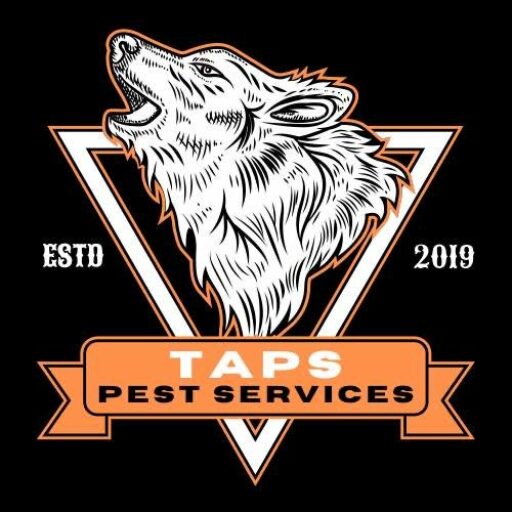Mosquito Control In Florida | Keep Mosquitoes Away From Your Yard This Summer

Key Takeaways For Mosquito Control In Florida & How to Keep Mosquitoes Away From Your Yard This Summer
- Effective mosquito control requires an integrated approach that combines elimination of breeding hotspots, natural repellents, protective barriers, and targeted treatments.
- Regular landscape maintenance and removing standing water are crucial for reducing mosquito breeding.
- Natural repellents, such as essential oils and repellent plants, complement chemical treatments in reducing mosquito presence.
- Professional pest control services offer advanced solutions through integrated pest management plans to sustain long-term mosquito management.
How to Keep Mosquitoes Away From Your Yard This Summer
Eliminate Mosquito Breeding Hotspots for Effective Florida Mosquito Control
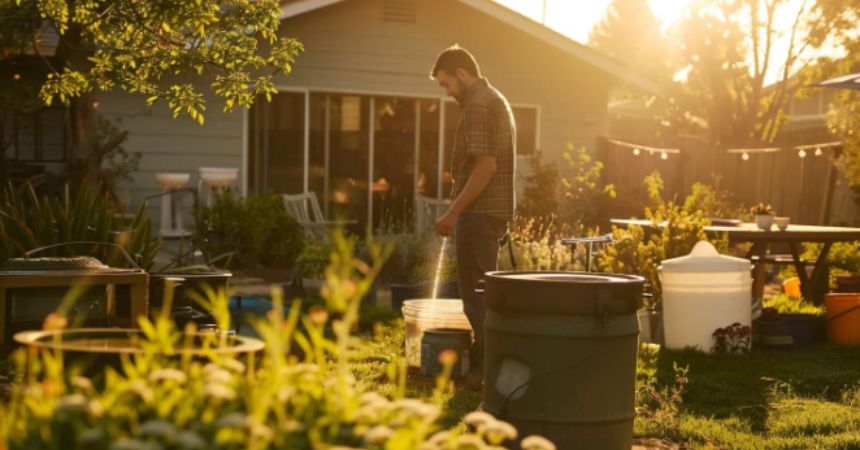
Eliminating mosquito breeding habitats is the cornerstone of effective mosquito control. Mosquitoes thrive in standing water where they lay eggs and develop from larvae into biting adults. Homeowners must be diligent in identifying and removing all potential water sources around their property. This not only reduces the mosquito population but also minimizes the need for chemical insecticides, which can impact local ecosystems.
Routinely Empty Standing Water From Containers and Playsets
Standing water can accumulate in plant saucers, buckets, toys, and pet water bowls. The process should begin with a routine inspection of all outdoor containers. Emptying these water sources on a weekly basis ensures that mosquitoes do not have the opportunity to lay eggs. Research from the Centers for Disease Control and Prevention (CDC) indicates that even small amounts of stagnant water can serve as breeding grounds for species like Aedes aegypti. In addition, flushing out bird baths and refreshing water in playsets are recommended.
Homeowners should consider using automatic water-level controllers to keep pet dishes from overflowing. Regular maintenance in all areas where water is present significantly reduces the available habitat for mosquito larvae, ensuring that your yard remains less attractive to these pests.
Clean Gutters and Downspouts to Prevent Water Accumulation
Gutters and downspouts can accumulate leaves and debris that cause water to pool. When left unchecked, clogged gutters can form mini-reservoirs of stagnant water and become optimal breeding sites. It is essential to clean gutters at least once a month during the rainy season or more frequently if you have many trees surrounding your home. Installing gutter guards or screens can also help prevent debris buildup.
By maintaining clear water pathways, water can flow freely to drainage systems rather than stagnating in low spots. Furthermore, proper maintenance of these water channels not only protects against mosquitoes but also prevents water damage to your home’s foundation.
Manage Water Levels in Bird Baths and Pet Dishes For effective Mosquito Control In Florida
Address Drainage Issues in Your Landscape to Reduce Puddles
Improper drainage in lawns and garden beds can lead to the formation of puddles and small ponds, which are ideal for mosquito reproduction. Inspect your yard for low spots where water tends to accumulate after rain. Installing French drains, regrading the landscape, or adding soil amendments to improve drainage can significantly reduce permanent water presence. It is also important to ensure that swimming pools, decorative ponds, and other water features are properly maintained.
Utilizing water treatment techniques, such as adding larvicides to ornamental water bodies, can prevent the development of mosquito larvae. By addressing drainage problems, homeowners can mitigate one of the primary drivers of mosquito infestation in Florida.
Use Mosquito Dunks in Rain Barrels and Unavoidable Standing Water
In some cases, completely removing standing water is not feasible. For example, rain barrels provide an essential resource for water conservation. In these scenarios, using mosquito dunks—biological control agents containing Bacillus thuringiensis israelensis (Bti)—can be an effective solution. These dunks release bacteria that specifically target mosquito larvae without harming other wildlife or plants. When used correctly, mosquito dunks can drastically reduce larval populations in rain barrels, ponds, and other water containers. The application is straightforward and safe for households with children and pets, making it an ideal supplementary measure.
By combining physical elimination with biological controls, homeowners can achieve a more robust reduction in mosquito populations.
Implement Natural Mosquito Repellent Strategies in Your Outdoor Space
In addition to eliminating breeding spots, employing natural repellent strategies plays a critical role in reducing mosquitoes in your yard. Natural repellents offer a safe alternative or complement to chemical insecticides and help create an environment that is hostile to mosquitoes while remaining friendly to beneficial insects and wildlife. These strategies involve using plants, essential oils, and encouraging natural predators.
Introduce Mosquito-Repelling Plants Around Patios and Walkways For Mosquito Control In Florida
Planting mosquito-repelling vegetation around your outdoor living areas helps to create a natural barrier against these pests. Plants such as citronella, lavender, marigold, basil, and rosemary emit scents that mosquitoes find repellent. For example, citronella is a well-known natural insect deterrent and has been shown to reduce mosquito landings by up to 80% when properly cultivated. Arrange these plants in clusters around patios, decks, and along walkways to provide a continuous barrier of protection.
Their dual function of enhancing the garden’s beauty while warding off pests makes them an excellent, eco-friendly solution. Real-world case studies in eco-friendly landscaping show that properly planted repellent species can yield significant reductions in mosquito activity.
Attract Natural Mosquito Predators Like Birds and Bats
Encouraging natural predators is a sustainable way to manage mosquito populations. Birds such as purple martins and swallows, along with bats, are known to feed on adult mosquitoes. Installing birdhouses or bat boxes near your yard can attract these natural predators. Studies have shown that areas with a high population of native insectivorous birds experienced a reduction in mosquito numbers by as much as 30%. Furthermore, providing a habitat for these predators not only helps in controlling mosquito populations implicitly, but also supports biodiversity.
By creating an environment that is welcoming for these species, you reduce the reliance on chemical treatments and foster a balanced ecosystem.
Utilize Essential Oils Safely for Area Repellency
Essential oils like eucalyptus, lemon, and tea tree oil have demonstrated mosquito repellent properties. These oils can be diffused in outdoor settings, combined with water in spray bottles, or used in candles. For instance, studies indicate that lemon eucalyptus oil is one of the most effective natural repellents, providing protection for several hours when correctly applied. It is important to use these oils safely and moderately, as concentrated forms may cause skin irritation or damage to plants. When used as part of an integrated pest management strategy, essential oils add an extra layer of defense without contributing to chemical resistance. Their pleasant aromas and natural origins make them a favored choice among environmentally conscious homeowners.
Position Fans to Deter Weak-Flying Mosquitoes During Gatherings
Mosquitoes are weak fliers and can be significantly deterred by the presence of a strong breeze. Strategically placing oscillating fans in seating areas can create air movement that disrupts the flight patterns of mosquitoes, making it difficult for them to settle and bite. This method is especially practical during outdoor gatherings, dinners, or even on patios. Research from entomological studies supports the effectiveness of fans in reducing the proximity of mosquitoes by providing consistent airflow. Not only does this approach provide immediate relief from mosquito irritation, it also creates a more comfortable ambiance for social interactions.
As a supplementary measure, fans offer a chemical-free, power-efficient means of enhancing outdoor comfort.
Apply Garlic Spray Treatments to Yard Foliage For Mosquito Control In Florida
Garlic spray acts as a natural insect repellent, and its active compounds can disrupt the chemical receptors that mosquitoes use to find their hosts. By applying a diluted garlic solution to yard foliage, homeowners can create a protective barrier that helps to reduce mosquito presence. Laboratories have shown that garlic-based treatments can lower mosquito activity for several days without negatively impacting plant health. While garlic spray may have a pungent aroma, its effectiveness as a natural pesticide makes it a viable option for those looking to minimize chemical use.
Regular applications, especially before peak mosquito periods, can enhance the long-term efficacy of this natural treatment. Combining garlic spray with other natural repellents strengthens the overall defense strategy against mosquitoes.
Create Protective Barriers Against Mosquitoes This Summer

Building protective barriers in your outdoor space is a proactive method to reduce mosquito exposure. Installing physical and behavioral barriers helps guard against mosquito-borne diseases and improves comfort during outdoor activities. These barrier methods are effective and cost-efficient, requiring minimal maintenance once installed.
Install or Repair Screens on Windows, Doors, and Porches
Use Mosquito Netting Over Seating Areas and Play Zones
Mosquito netting provides an additional layer of protection for areas where people gather. Covering seating areas, play zones, and outdoor dining spaces with high-quality netting helps prevent mosquitoes from landing on people.
Netting is especially useful during dusk and dawn when mosquito activity peaks. The physical barrier afforded by mosquito nets has been proven effective in clinical studies, particularly in regions where vector-borne diseases are a serious concern.
Additionally, portable nets that can be draped over outdoor furniture offer temporary measures that are both versatile and reusable. By deploying netting as a simple and low-cost solution, homeowners can enjoy their outdoor spaces without the constant threat of mosquito bites.
Choose Outdoor Lighting That Attracts Fewer Insects
Certain types of outdoor lighting are designed to minimize insect attraction. Traditional incandescent bulbs tend to emit wavelengths that attract mosquitoes, whereas LED lights with specific color temperatures can deter them. Selecting outdoor lighting fixtures that use warm, yellow-hued lights or LED designs reduces the likelihood of insects congregating near seating areas. Studies have demonstrated that areas illuminated with LED lighting experience up to a 50% reduction in mosquito attraction compared to those lit by conventional bulbs.
Besides reducing mosquito activity, this approach can provide energy savings and a more pleasant ambiance for outdoor settings. Homeowners are advised to install motion sensor lights and timers, ensuring lights are used only when needed, further minimizing insect attraction.
Wear Light-Colored, Protective Clothing During Peak Mosquito Hours
Adopting personal protective measures complements environmental strategies in warding off mosquitoes. Light-colored clothing is less attractive to mosquitoes than dark, absorbent fabrics. Additionally, wearing long sleeves, pants, and socks reduces exposed skin, minimizing the chances of bites. This is particularly important during peak mosquito activity periods, such as early morning and evening hours.
By combining physical barriers with protective clothing, individuals significantly lower the risk of mosquito-borne diseases. Experts recommend that outdoor gatherings during mosquito season include dress code suggestions aimed at reducing exposure. This simple yet effective approach, when combined with environmental and chemical measures, completes a comprehensive mosquito control strategy.
Select and Apply Yard Treatments for Mosquito Reduction
Understand Different Types of Mosquito Sprays and Foggers
Mosquito control products come in various formulations including residual sprays, thermal foggers, and misting systems. Residual sprays provide long-lasting protection when applied to vegetation and outdoor surfaces.
Thermal foggers generate a fine mist that can temporarily reduce adult mosquito populations in the immediate area by up to 80%. It is important to understand the difference between repellents, which deter mosquitoes, and insecticides, which kill them outright. While chemical options are effective when used as directed, integrated pest management advocates recommend combining them with natural methods for a balanced approach.
Reading labels and product reviews can help users select products tailored to their specific yard and environmental conditions.
Target Shady and Humid Areas Where Adult Mosquitoes Rest
Adult mosquitoes are known to seek shelter in shaded, humid areas during the heat of the day. Applying treatments to these microhabitats can significantly reduce the local mosquito population. This includes spraying dense shrubbery, tall grasses, and under decks where moisture tends to accumulate. Focusing on these high-risk areas ensures that active adult mosquitoes are exposed to the insecticide, reducing their numbers and lowering the chance of bites.
Research has shown that targeted application in known resting areas is more effective than blanket spraying across an entire yard. Integrated pesticide strategies emphasize precise applications to maintain environmental balance and reduce non-target impacts.
Follow Product Instructions Carefully for Safe Application
Adhering to manufacturer guidelines is essential when applying yard treatments. Inappropriate use of insecticides can lead to chemical resistance in mosquitoes and may pose risks to non-target species, including beneficial insects, pets, and even humans. Homeowners must wear protective gear, apply the correct dosage, and ensure that application times are chosen based on peak mosquito activity.
Safety precautions such as waiting periods before re-entering treated areas are crucial. By following the label instructions, users ensure that the product is effective and that the risk of environmental contamination is minimized. Professional pest control services always emphasize the importance of adhering to these guidelines to guarantee both safety and effectiveness.
Consider Eco-Friendly and Pet-Safe Treatment Options
In today’s environmentally conscious society, many homeowners prefer treatments that are both eco-friendly and safe for pets. Organic insecticides, such as those derived from neem or pyrethrin, offer a viable alternative to synthetic chemicals. These products break down more rapidly in the environment and pose a lower risk to beneficial insects and aquatic organisms.
Several studies have shown that eco-friendly mosquito treatments can reduce adult mosquito populations without compromising soil or water quality. Checking with local extension services or pest control professionals can provide recommendations on products that have been successfully used in similar environments. Combining eco-friendly treatments with traditional methods can lead to comprehensive mosquito control while preserving the natural beauty of your yard.
Time Applications for Maximum Effectiveness Based on Mosquito Activity
Understanding the daily and seasonal behaviors of mosquitoes enhances the effectiveness of yard treatments. For instance, treatments applied during early morning or dusk when mosquitoes are most active have been proven to yield better results. Seasonal timing is also critical; applying larvicides immediately after rainfalls and before mosquito populations explode prevents significant outbreaks.
By planning treatment schedules in tandem with weather forecasts and local mosquito surveillance reports, homeowners can optimize the impact of their efforts. Professional pest controllers frequently use data-driven schedules to determine optimal treatment times. This proactive approach not only reduces immediate mosquito populations but also helps to maintain lower breeding levels over time.
Engage Professional Mosquito Control Services in Florida
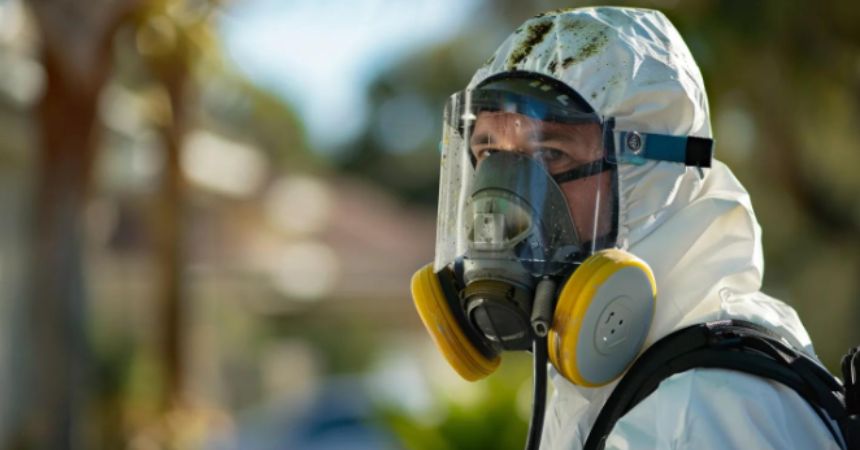
While many mosquito control strategies can be effectively implemented by homeowners, there are times when professional intervention is required. Mosquito infestations may become overwhelming, especially when multiple breeding sites combine with large adult populations. Professional mosquito control services in Florida offer integrated pest management solutions that encompass both chemical and biological treatments. Professionals have the expertise, equipment, and licensing necessary to accurately diagnose infestation levels and apply treatments safely and effectively.
Identify When to Call Experts for Mosquito Infestations
Homeowners should consider calling professional pest control services when mosquito populations become unmanageable despite routine treatments. Warning signs include persistent biting, noticeable egg rafts in water sources, and continuous sightings in protected areas despite frequent cleaning. Experts use advanced detection methods, such as CO₂ traps and larval sampling, to assess the extent of infestations and determine the most effective treatment plans.
Additionally, when mosquito-borne diseases pose a significant risk to public health, professional intervention is critical. Timely expert intervention ensures that the infestation is effectively addressed using a combination of treatments that minimize the risk of future outbreaks.
Research Local Florida Mosquito Control Providers and Their Methods
Selecting the right pest control provider is critical. Homeowners should research local companies to ensure they use integrated pest management (IPM) approaches that combine both chemical and non-chemical control methods. Reading reviews, asking for references, and verifying licensing information are essential steps. Providers that offer comprehensive service plans including monitoring, follow-up treatments, and preventive education will offer the best long-term results.
In Florida, where mosquito species and populations vary by region, locally knowledgeable experts can offer tailored solutions to effectively control mosquitoes. Customers are encouraged to inquire about past successes and any certifications that verify the efficacy and safety of the methods used.
Inquire About Integrated Pest Management Approaches
Integrated Pest Management (IPM) is a holistic approach that combines cultural, biological, and chemical methods for sustainable pest control. Professional providers implementing IPM do not rely solely on chemical treatments; instead, they tailor their approach based on environmental assessments and mosquito activity data. This minimizes the risk of chemical resistance while preserving beneficial organisms.
When consulting with a pest control service, ask detailed questions about their methodology, the types of products used, and how they plan to integrate natural and chemical controls. Providers who emphasize IPM are often more committed to long-term, environmentally responsible solutions.
Prepare Your Yard for a Professional Mosquito Treatment
Before a professional treatment, proper preparation of the yard is essential. Homeowners should remove clutter, mow the lawn, and eliminate any temporary water accumulations that can interfere with treatment efficacy. Guidelines provided by the service should be followed to ensure that the chemicals or biological agents are able to reach their target areas effectively. Leaving clear access to critical treatment areas allows the technician to apply treatments uniformly, increasing overall effectiveness.
This preparatory step is key to ensuring that professional treatments work synergistically with ongoing maintenance efforts. A well-prepared yard reduces re-infestation and enhances the lasting impact of the treatment.
Understand Ongoing Service Plans for Sustained Mosquito Management
Mosquito control is not a one-time affair. Effective management often involves an ongoing service plan that includes routine monitoring, periodic treatments, and homeowner education. Professionals will often offer maintenance contracts that schedule seasonal treatments and provide support during peak mosquito activity periods. These contracts ensure that mosquito populations remain low throughout the critical months. Being aware of the commitment required for sustained mosquito management can help homeowners budget and plan for services accordingly. In Florida, where mosquito activity can be prolonged, ongoing service plans provide stability and peace of mind by preventing sudden infestations.
Maintain a Mosquito-Resistant Yard Throughout the Season
Long-term success in mosquito control relies on a proactive and sustained maintenance routine. Even after initial treatments, the dynamic nature of Florida’s environment means that vigilance is necessary to keep mosquito populations in check. Effective lawn care, regular removal of organic debris, and periodic reapplication of treatments are all essential parts of a comprehensive mosquito management plan. This section reviews strategies that help sustain a mosquito-resistant yard throughout the summer.
Regularly Mow Your Lawn and Trim Overgrown Vegetation
Remove Yard Debris Like Leaf Piles and Grass Clippings
Yard debris such as leaves, branches, and grass clippings can retain moisture and create hidden pockets where mosquitoes breed or rest during the day. Regular cleanup routines, including raking and removing these materials, are essential. Debris removal not only improves the aesthetics of your yard but also enhances air circulation, reducing humidity levels that favor mosquito survival. By routinely eliminating these organic materials, homeowners can avoid the formation of unintended breeding sites and support overall landscaping health. Integrating these practices into regular yard maintenance routines has been shown to lead to measurable reductions in mosquito counts in residential areas.
Monitor and Re-Treat Areas Prone to Mosquito Activity
Even with comprehensive treatments, some areas in your yard may remain hotter spots for mosquito activity. Regular monitoring is crucial. Homeowners should inspect shady, damp areas, especially after a rainstorm, and reapply larvicides or repellent treatments as necessary. Keeping a log of treatment dates and observed mosquito activity can help in determining the frequency required for reapplications. This data-driven approach ensures that treatments are timely and effective. Combining professional advice with homeowner vigilance results in a more resilient mosquito control strategy throughout the changing summer months.
Educate Family and Neighbors on Mosquito Prevention Techniques
Mosquito control is most effective when practiced collectively. Sharing knowledge about prevention techniques with family members and neighbors can create a broader community defense against mosquitoes.
Workshops, community meetings, or simple informational brochures distributed locally can raise awareness. When multiple households implement similar preventive measures, the overall mosquito population can be significantly reduced. Educating residents about simple steps—like reducing standing water and using nets—does not only improve individual yards but also benefits entire neighborhoods. Community engagement is an integral part of long-term mosquito management strategies.
Adapt Your Mosquito Control Plan as Summer Conditions Change
Florida’s weather can be unpredictable. As the summer season progresses, changes in rainfall, temperature, and wind patterns can impact mosquito behavior. A successful mosquito control plan requires flexibility and adaptation. Homeowners should re-evaluate their strategies periodically, adjusting treatments and maintenance routines to match current conditions. Staying informed about local mosquito surveillance reports and weather forecasts can guide the timing and selection of treatments. Flexibility in approach ensures that even unexpected surges in mosquito activity are met with effective countermeasures. An adaptable, responsive strategy is key to maintaining a pest-resistant yard during the long, hot Florida summer.
Table: Mosquito Control Methods Comparison
Below is a summary table detailing various mosquito control methods, their primary functions, benefits, and environmental impact. This table offers a quick reference guide for comparing options and selecting the most appropriate strategies for a mosquito-resistant yard.
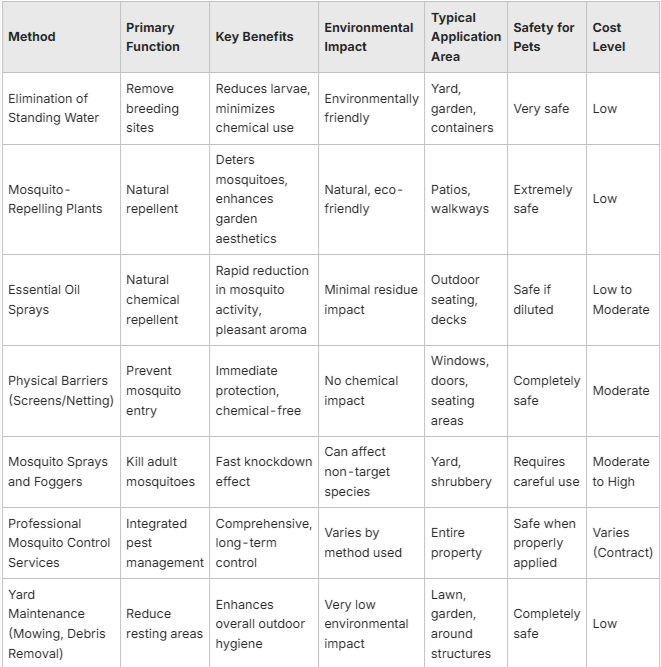
This table provides a convenient comparison and illustrates that a combination of methods is often necessary for effective mosquito control.
Final Thoughts
Mosquito control is an ongoing challenge, particularly in climates like Florida’s where favorable conditions persist throughout the summer. By integrating multiple control strategies—including eliminating breeding sites, using natural repellents, establishing physical barriers, and applying targeted treatments—homeowners can significantly reduce mosquito populations. Engaging professional services adds an extra layer of assurance through integrated pest management, ensuring that your control measures adapt as conditions change. This guide provides a roadmap for creating a safer, more comfortable outdoor environment, ultimately enhancing health, enjoyment, and property value.
Additional Resources
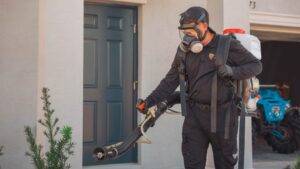
How Much Do Pest Control Services Cost In Florida?
Florida’s year-round pest pressure isn’t just a nuisance—it’s a budget item. Whether you’re managing a single-family home or multiple rental properties, it helps to understand what pest control services cost, what affects those prices, and how to get the most value without compromising your safety or peace of mind.

Benefits of Quarterly Pest Control
Florida’s warm climate offers year-round sunshine and comfort, but it also creates ideal conditions for a wide variety of pests. From mosquitoes in the summer to rodents and ants in cooler months, Florida homeowners face constant pest threats that can cause property damage, health issues, and daily discomfort. This makes quarterly pest control not just a convenience, but a necessity for maintaining a safe and healthy home environment.
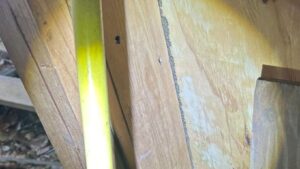
The Hidden Dangers of Termites and Signs to Watch For
Termites are small, often unnoticed insects that cause immense damage to structures and properties over time. Often operating silently behind walls, under floors, or within wooden frameworks, these pests compromise the structural integrity of buildings and negatively impact property value.
Frequently Asked Questions About Mosquito Control in Florida
Mosquito breeding areas are generally identified by the presence of standing water. Check for water that collects in plant saucers, clogged gutters, unused containers, and puddles in low-lying areas. Observing mosquito larvae or small clusters of insects in these spots is a clear indication. Regular inspection, especially after rainfall, is crucial for early detection and to prevent large-scale infestations.
Natural mosquito repellents, such as essential oils and repellent plants, have been shown to be effective, particularly as part of an integrated approach. While they may not provide immediate knockdown like chemical insecticides, they offer long-lasting protection and are environmentally safe. Combining these with proper yard maintenance can achieve significant reductions in mosquito populations without the adverse impacts associated with chemicals.
Professional pest control services offer a tailored approach to mosquito management that includes advanced detection, integrated pest management strategies, and regular monitoring. They can assess your property, identify high-risk areas, and implement treatments that are both effective and safe. Their expertise ensures that both chemical and natural methods work in harmony and adapt to seasonal changes, ultimately providing long-term, sustainable control.
The frequency of reapplication depends on the treatment type and environmental conditions. For instance, essential oil sprays and garlic solutions may need to be applied weekly or after heavy rains. Professional treatments might be scheduled bi-weekly or monthly, depending on the severity of the infestation. Regular monitoring of your yard will help determine the ideal treatment intervals to keep mosquito populations low.
Physical barriers, including netting and screens, significantly reduce but may not absolutely eliminate the chance of mosquito bites. When used properly—especially in conjunction with other control measures—they serve as a highly effective line of defense by preventing mosquito access during high-risk periods. Netting over seating areas and windows is recommended to minimize contact, particularly during sleep or outdoor gatherings.
Mosquito dunks contain Bacillus thuringiensis israelensis (Bti), a bacterium that specifically targets mosquito larvae. When placed in standing water, these dunks release a toxin that kills larvae without impacting other organisms. They are considered safe for gardens, pets, and humans when used as directed. This biological control method is an excellent option for rain barrels and other water features that are essential to your home environment.
Engaging professional services ensures a sustained reduction in mosquito populations due to their expertise in integrated pest management. Long-term benefits include decreased mosquito breeding, improved outdoor comfort, and reduced risk of mosquito-borne diseases. Professional treatments are designed to adapt to seasonal changes and can provide ongoing support and monitoring that help maintain a mosquito-resistant yard year after year.



